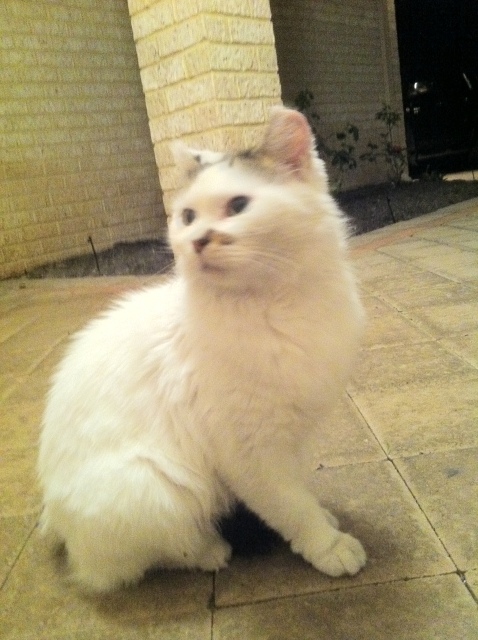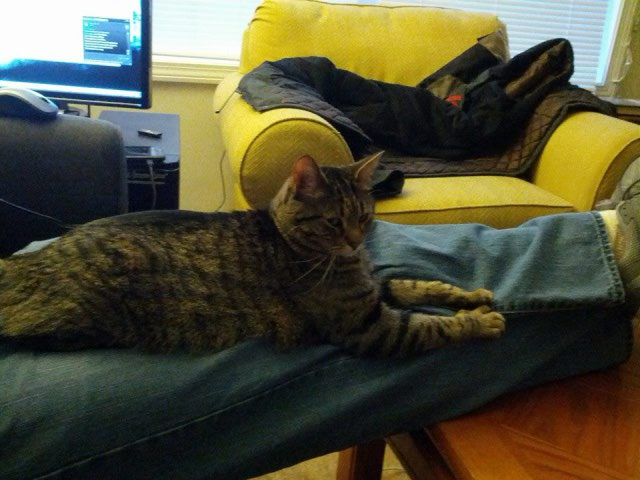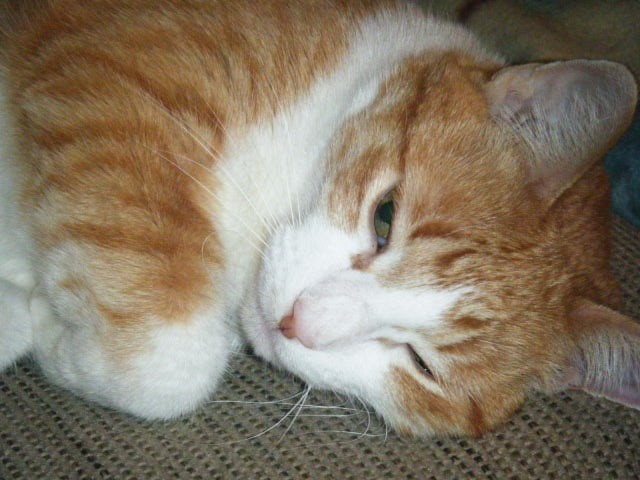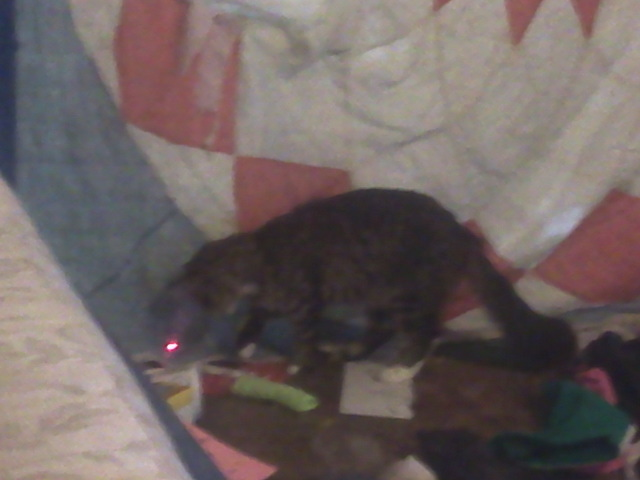QuestionWe are thinking of getting a kitten. We have a 15 year old cat, with kidney disease. I was wondering if a kitten or young cat (2 or 3 yrs old) would stress her out or if they would get along. The current cat was one of 3 cats for 12 yrs. 3 years ago we had to put 2 of them down within a 10 month period. She seems to be content as an only cat, though likes to spend lots of time with me. My children would like another cat, but I'm uncertain if this would really be a good or bad thing for the current cat. Can ou please give us your thoughts and advice on the subject? Thanks!!!
AnswerMargaret,
I think that there are many things to consider in this case. First of all the age of the children will dictate what they will be able to understand. I really do think that it's important to educate children about the responsibility of caring for a pet of any species. That responsibility starts from the moment that you agree to bring a pet into your life and continues until that pet is ready to move on to the Rainbow Bridge. I have a few pieces of information that you might want to research before making any decisions about whether or not it's the right decision to add a new cat or kitten to your household at this time. Treatment protocols for renal failure are changing and veterinary medicine is trying to evolve to prevent kidney disease and other conditions common in aging cats.
My eldest resident cat MC developed renal failure at the end of the Menu Foods scare, she almost died as a result of her kidneys shutting down. I ended up taking my girl into the emergency veterinarian at 2 am one morning and consenting to blood tests and x-rays. The attending vet suggested that it might be kinder to euthanize MC because she was likely to die, I opted to make her comfortable and take her to my family vet first thing the next morning. My family veterinarian is a holistic practitioner and she didn't make any judgements, she simply said let's put her on a diet that will allow her kidneys to rest and give her fluids to flush out the toxins in her system, we'll reassess her in a day or two. Initially things didn't look good and the other vet in the practice didn't have much hope that MC would recover. We opted to let her be for a couple of days more and make a final decision then. My family vet actually gave MC some homeopathic remedies to help her kidneys come around and kept her on a low protein diet and IV fluids. On Friday night I got the most amazing phone call - MC's blood results were back and the other vet in the practice contacted me and joyfully expressed her total disbelief, it was official, MC's kidney values had returned to normal and I could come and pick her up the following morning. I was told by a locum vet at that point that MC would require a low protein diet and subcutaneous fluids most likely for the rest of her life. MC immediately decided that she wouldn't eat her low protein food when she got home, I guess that she felt as though she was home and didn't want anymore hospital food...Maybe cats aren't all that different from people after all! I started off by force feeding MC her low protein food four times a day, every day. I was heart broken, my little girl was running away from me whenever I went to pick her up because she thought that every time I would hold her she would be forced to eat food that she didn't want to or I would poke her with a needle. I did some research online and found that there are two very different schools of thought in the veterinary profession when it comes to cats with renal failure.
Many recent studies indicate that renal failure in cats could be caused in part by people overvaccinating their cats. After all we don't get vaccines for measles, mumps, rubella, polio or tetanus each year when we go to the doctor for our annual check up. The theory is that by overstimulating the cat's immune system we are setting them up for autoimmune conditions and kidney failure. The recommendation to help reduce this possibility is beginning to change. Now vet colleges are recommending that pets be vaccinated properly as a kitten or young cat and then determine the need for further vaccines by testing immunities in the blood stream or cycling vaccines. What the term cycling vaccine means is that instead of annual vaccines pet parents vaccinate their cats on a cycle, each year is a different vaccine. Cycling vaccines may not be legal in your area when it comes to rabies vaccines so it's worth speaking to your vet to find out what the regulations are in your area. Whether or not to vaccinate a cat annually for rabies does become a liability issue in some cases, if your cat bites someone having a current vaccine certificate may save your cat's life.
Another common issue that's being debated within the veterinary community when it comes to cats and kidney disease is diet. Should we feed cats with renal disease low protein foods or should we simply change their diet to include only the highest quality proteins without restricting the specific amount of protein in their diet. Some vets believe that low protein diets are the answer, they essentially help the kidneys function on cruise control. Other veterinarians believe that the amount of protein we feed our cats doesn't really matter, it's about the quality of the protein sources. I wanted to share my oldest resident cat's story so that you could have some concrete information to do the research about the kind of care that you want to provide for your elderly cat. Low protein diets may not be the only answer.
When my eldest resident cat was diagnosed with renal failure I was heartbroken, two different vets suggested that it might be kinder to euthanize her rather than continue treating her. I have an incredible amount of respect for my family vet, she is a holistic practitioner and she tends not to make snap judgements. After MC was released from the hospital my family veterinarian followed her closely for a year testing her kidney values every couple of months. My little girl beat the odds and improved steadily. Since my vet is a holistic practitioner she tends to believe in caring for pets with as little unnecessary intervention as possible. When I brought MC home from the hospital I was told that she would require an expensive prescription low protein diet and supplementary fluids for the rest of her life. Obviously I was very surprised when my vet recommended that I try and wean MC off of the fluids when we went for her annual health check. Weaning MC off of her fluids has been a gradual process, now she's down to between 2-4 injections of around 150-200 ml of lactated ringer's each month, this time last year she was getting 200-250 ml of fluids every day. I had a number of questions about nutrition and kidney disease so my family vet recommended that I check out catinfo.org. You may not be entirely comfortable feeding the diet described on this website, but it's worth reading as it provides important insight on the dietary needs of our feline carnivores. I'm not able to afford the high quality organic meats described in this diet, but I have found an alternative that I'm comfortable with. I feed a very high quality cat food that's made with human grade ingredients called Spot's Stew Sensitive Cat by Halo, this food comes in canned and dry varieties.
The ingredients for this cat food are as follows: Turkey, Pea Protein, Whole Dried Eggs, Oats, Pearled Barley, Pea Flour, Turkey Liver, Salmon, Flaxseed, Salmon Oil, Pea Fiber, Sweet Potatoes, Apples, Blueberries, Green Beans, Carrots, Cranberries, Zucchini, Alfalfa, Inulin, Calcium Sulfate, Potassium Chloride, Taurine, Salt, Folic Acid, Zinc Proteinate, Iron Proteinate, Cobalt Proteinate, Copper Proteinate, Manganese Proteinate, Vitamin A Supplement, Vitamin D3 Supplement, Vitamin E Supplement, Choline Bitartrate, Niacin, Pantothenic Acid, Ascorbic Acid, Ribflavin Supplement, Thiamine Mononitrate, Pyridoxine Hydrochloride, Biotin, Lactobacillus Acidophilus, Bifidobacterium Longum, Enterococcus Faecium, Lactobacillus Plantarum, Calcium Iodate, Sodium Selenite.
I have been feeding MC a combination of canned and dry Spot's Stew for almost a year now and I believe that it's been helping her kidneys regain their function. In short I don't think that the protein issue is about quantity, it's about quality. You may be surprised at how changing your cat's diet could improve her health and it may possibly even allow her body to heal itself.
In short my concerns about adding a new cat/kitten to your household would be centered on your current resident cat's health. Right now she's roughly equivalent to a 76 year old human being so she may not be in the mood to handle a younger high energy kitten coming into her home and pouncing on her. She's in her golden years at the moment and she deserves to enjoy them for as long as humanely possible. If this little girl's kidneys are in really bad shape she may become even more medically unstable if a new cat comes into the picture. It's a very personal judgement call. You may also decide that it's well worth checking into holistic care for your kitty to see if that would improve her quality of life enough that she would enjoy having a new companion. At this point it's very important to do your research and find a vet that is willing to provide your kitty with treatment your family as a whole is completely comfortable with before making any decisions when it comes to adding another kitty to your household. You have to decide what's best for your aging cat and your family, this isn't a decision that anyone else can make for you. If you do decide to add another feline to your family I would recommend that you consider reading over my previous answers on new cat/kitten introductions to minimize the stress on everyone involved. I would be interested in hearing whether or not you found my information on renal disease useful as well as whether or not it helped you to make a decision about adding another cat to your household.

 Pregnant cat and her to be kittens.
Question
Scarlett
Recently (May 2011) we adopted a stra
Pregnant cat and her to be kittens.
Question
Scarlett
Recently (May 2011) we adopted a stra
 cat disappeared
Question
pusscat at home
My cat came to me at 6 months
cat disappeared
Question
pusscat at home
My cat came to me at 6 months
 Chinese Li Hua?
Question
Magnus1
Hi,
My husband and I recently
Chinese Li Hua?
Question
Magnus1
Hi,
My husband and I recently
 blackened area under lower jaw
Question
Daisy
My Daisy is a 12 year old short-h
blackened area under lower jaw
Question
Daisy
My Daisy is a 12 year old short-h
 dones my cat sweet pea look pregnant?
Question
sweet pea sweet pea nipples
Hi w
dones my cat sweet pea look pregnant?
Question
sweet pea sweet pea nipples
Hi w